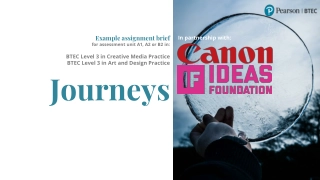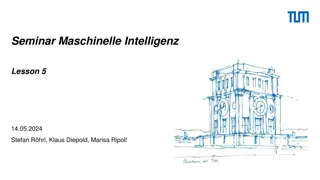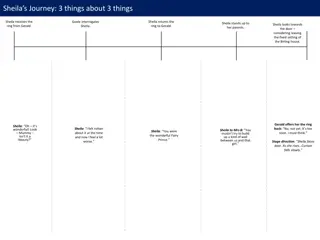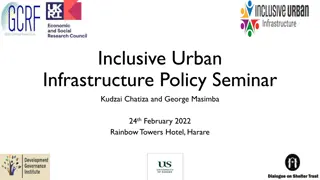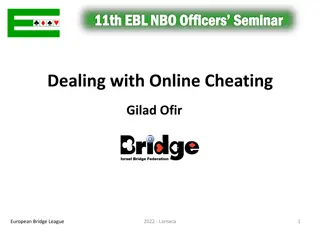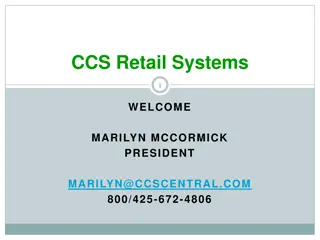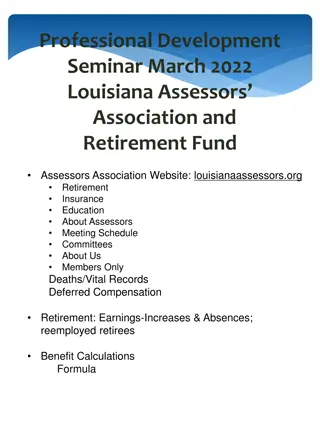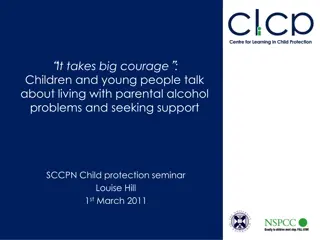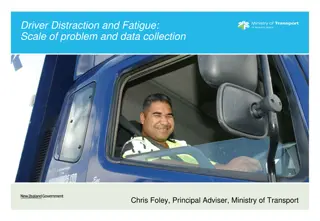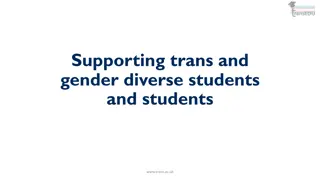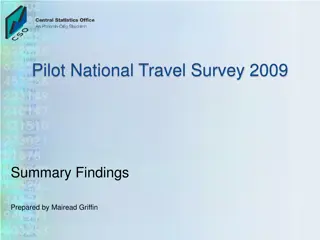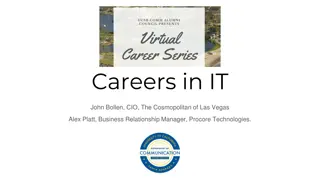Understanding the Journeys of Excluded Children: Seminar Series on Theographs
Join Sarah Martin-Denham in a seminar series exploring the use of theographs to understand the experiences of children excluded from school. Dive into interpretative phenomenological analyses, research on school exclusions, and experiences of caregivers. Discover insights on barriers to mainstream schooling and pathways to school exclusion, shedding light on crucial issues in education and well-being.
- Education Research
- School Exclusions
- Interpretative Phenomenological Analysis
- Child Well-being
- Seminar Series
Download Presentation

Please find below an Image/Link to download the presentation.
The content on the website is provided AS IS for your information and personal use only. It may not be sold, licensed, or shared on other websites without obtaining consent from the author. Download presentation by click this link. If you encounter any issues during the download, it is possible that the publisher has removed the file from their server.
E N D
Presentation Transcript
Centre for Research in Education: Seminar Series The use of theographs to understand the journeys of children excluded from school Sarah Martin-Denham @blogsenco 10thNovember 2020
Senior Lecturer and Researcher Programme Leader and Tutor NASENCO Author for Sage Publishers Convenor Interdisciplinary Research Network: Adverse Childhood Experiences North East Chair: Independent SENCO Network Senior Fellow Higher Education Academy Vice-Chancellor Teaching Fellow For those who I have never met...
TfC Funded School Exclusions Research Main room Q and A discussion Break out rooms 3:00 3:30 3:45 PM 4:00 PM 4:30 PM 4:45 PM 3:30 3:45 4:00 PM 4:30 PM 4:45 PM 5:00 PM Q and A discussion and close Theographs and Interpretative Phenomenological Analysis (IPA) Break out rooms
5Martin-Denham, S. (2020/21) School exclusion, substance misuse and use of weapons: An interpretative phenomenological analysis of interviews with children. Support for Learning [in press] 1Martin-Denham, S. (2020a) The enablers and barriers to successful managed moves: The voice of children, caregivers and professionals https://sure.sunderlan d.ac.uk/id/eprint/11942/ 6Martin-Denham, S. (2020/21) Riding the roller coaster of school exclusion coupled with drug misuse: The lived experience of caregivers. Emotional and Behavioural Difficulties. doi.org/10.1080/13632752.2020.1848985 [in press] Evidence base (for today) Sure.sunderland.ac.uk 2Martin-Denham, S. (2020b) An investigation into the perceived enablers and barriers to mainstream schooling: The voices of children excluded from school, their caregivers and professionals https://sure.sunderlan d.ac.uk/id/eprint/11941/ 7Martin-Denham, S. and Donaghue, J. (2020) Out of sight, out of mind? Managed moves in England. Sunderland: University of Sunderland. https://sure.sunderland.ac.uk/id/ep rint/11883/ 3Martin-Denham, S. (2020c) A review of school exclusion on the mental health, well-being of children and young people in the City of Sunderland https://sure.sunderland .ac.uk/id/eprint/11940/ 8Martin-Denham, S. and Donaghue, J. (2020) Excluded for no real reason. Sunderland: University of Sunderland. https://sure.sunderland.ac.uk/id/ep rint/11472/ 9Martin-Denham, S. (2021) An interpretative phenomenological analysis of pathways to school exclusion: Children with Autism. Autism (in works) 4Martin-Denham, S. and Donaghue, J. (2020) Impact and Measure of Adverse Childhood Experiences. Journal of Public Health https://rdcu.be/b68MO
Impact... o Driving local health, education and care provision o DfE Roundtable events (presentation and circulation) o Dame Carol Black Independent Drugs Review (Dept of Health and Social Care) o Children's Commissioner Office (presentation and circulation) o Cabinet Office Chief Scientist/Director of Research Behaviour Insights Team o DfE SEND Review (circulation/reference) o Poriticus hosted on IntegratED/Oxford Uni Excluded Lives matter o Social Finance o NHS England o Centre for Social Justice o Policy change use of category 'other' o REF
In total there were 174 participants interviewed. In addition, there were three advisory groups, 12 children, five professionals from health/support services and five education professionals. Exclusions research Sunderland: Funded by Together for Children1,2,3,5,6 This is the most substantial piece of primary research carried out to date on the enablers and barriers to mainstream schooling for those at risk of school exclusion in England.
School Exclusions A fixed period exclusion is defined as when a pupil is barred from school for a fixed amount of time (including exclusions during lunchtime) (DfE, 2017, p.56). A permanent exclusion is defined as when a pupil is permanently barred from school premises (DfE, 2017, p.56) Unofficial exclusions: These are not recorded as exclusions in the national data and include managed moves to a different school; a move into some form of alternative provision offsite; or illegal exclusions such as off-rolling (Martin-Denham, 2020)
The aim of the research was to provide a detailed examination of personal lived experiences of participants, the qualitative approach chosen was mixed methods including content (interpreting and understanding) and interpretative phenomenological analysis (IPA) (Smith and Osborn, 2015). Methodology
IPA: Commitment to understanding the participants point of view... A two-stage process or double hermeneutic was used, where the participant makes sense of their world and the researcher, in an active role, attempts to authentically make sense of their experiences (Colaizzi, 1978; Giorgi, 1985; Smith and Eatough,2007; van Manen, 2014; (Harding,2019). The data from the interviews with the children and caregivers were suitable for IPA as they included rich detail with novel stories and language (Riley et al., 2017; Riley et al., 2018; Spiers et al., 2017; Spiers et al., 2018; Spiers and Riley, 2019; Smith et al., 2009) Significance of the phenomena of interest, yielding a rich description of the phenomena of interest (Cresswell and Cresswell, 2013)
IPA process Detailed listening to audio and multiple readings of the transcripts to obtain a holistic perspective and to document initial thoughts in note form Initial emergent themes from each interview were identified and organised into clusters (abstraction) Refining and condensing data to create superordinate themes and examining for connections and similarities across emergent themes Creating a narrative account of the interplay between the interpretations of the researcher and the participants experiences in their own words
In depth interviews (A conversation with purpose) 20 90 mins in length Open and expansive question The types of questions Descriptive: Can you tell me about your child? Narrative: Can you tell me about how they came to be excluded from school? Structural: When did you first notice difficulties? (stages) Contrast: What were the differences between alternative and mainstream provision? Evaluative: How did the drug use impact on you and your family? Circular: What do you think your child thinks about why they were excluded? Prompts: Can you tell me more about that? Probes: What do you mean by 'unfair?' Lots of why, how, can you tell me more, what were you thinking type questions...
Nothing (6) What the key stage 1 children enjoy about mainstream school Breaktime (6) Eating at lunch (4) Being with friends (4) PE (3) Learning (2) Being alone (1)
DfE (2016) Behaviour and Discipline Guidance Allows schools to place children away from others for a limited period', later clarified by Ofsted (2018) 'Emotional abuse is any type of abuse that involves the continual emotional mistreatment of a child. It's sometimes called psychological abuse. Emotional abuse can involve deliberately trying to scare, humiliate, isolate or ignore a child' (NSPCC, 2020) Martin-Denham 20202
Impact of isolation (children)2 I used to pull my hair out, scratch my face. I couldn t cope with it at all. The teachers used to sit there and watch me cry I used to pull my hair out, scratch my face. I couldn t cope with it at all. The teachers used to sit there and watch me cry 'They used to call it the bridge because it made you want to just jump off a bridge 'They used to call it the bridge because it made you want to just jump off a bridge They just told you to sit down and get on with your work, no teaching They just told you to sit down and get on with your work, no teaching Not taught just worksheets, just had to figure that shit out for myself' Not taught just worksheets, just had to figure that shit out for myself, I didn t do anything. So that is why I came to this school knowing nothing' I didn t do anything. So that is why I came to this school knowing nothing'
Impact of isolation (caregivers)2 'Shoved in a room and not spoken to. That would be for a lot of the time . It s like a prison and they are locked in the room . You are basically torturing him. How can you expect him to work when he doesn t have time to reset himself? When he doesn t have a break from that room . If you re going to lock him up in a room well, he ll just be like a crazed animal No breaks and not being able to communicate with teachers or peers they don t get break times, they don t get lunchtimes. A cold sandwich gets sent from the main school across. A school we know uses the term lockdown for isolation. We re putting you in lockdown? Wow! It s like come on. What type of word is that? They ve got no windows in the room where the child goes. Then they panic and just misbehaves again and gets another day added on . They had to sit in silence all day. I don t agree with isolation, sitting in silence he would come home in a complete mood. Because obviously he had sat there for hours, not being able to speak .
Caregivers what could have prevented the exclusion? 'They need to listen. They were very quick to say he was naughty' 'Listen to the kids, when they get a bit silly in their chairs, they can't sit still. Now is the time to take them out, to make them run around the field a couple of times' 'They need training. They need to understand not just the strategies but how to apply them and do a course to understand, sometimes their reaction is just anxiety' 'Doctors pushed me back to nursery staff, who pushed back at me. I had nowhere to turn' 'I was told to wait until he was five, he was only three, as soon as he was five he was permanently excluded'.
Solutions: Key stage 1 'Shorter school days' 'Nurture group' 'Cuddling' 'Having time to talk' 'Help me make good choices' 'To bring in teddies and fidget cubes'
Solutions: Key stage 2/3 'If someone had explained the work. I would have done it. I would have understood it' 'If they had given you a list, like a power point. It tells you; you need to this, then this and this' 'I need more staff helping, explaining things, maths was the only lesson I could get because I have dyslexia. They weren't helping with that' 'Maybe not restrain me as much' 'The more they shout, the more I shout' 'Football calms me down when I am with my friends'
KS4 Advisory Group 'Teachers need to pick their priorities. I got isolated for not tucking my shirt in'. 'Take away isolation booths' 'Try to understand the problem, rather than dish out the punishment' 'Be fair and give more support in lessons' 'Teachers that understand learning difficulties' 'Have more ways for children to cope' 'Smaller classes' 'Teachers need to respect us'
The research highlighted widespread use of isolation booths, in relation to this consider the following: 'Emotional abuse is any type of abuse that involves the continual emotional mistreatment of a child. It's sometimes called psychological abuse. Emotional abuse can involve deliberately trying to scare, humiliate, isolate or ignore a child' (NSPCC, 2020) Break out room discussion 1: 3:30-3:45 3:45-4pm:Q and A What are the alternatives?
Theographs 1 5Martin-Denham, S. (2020/21) School exclusion, substance misuse and use of weapons: An interpretative phenomenological analysis of interviews with children. Support for Learning [in press]
IPA Process (Ben) 1. Listen to the original recording multiple times, read and re-read transcripts 2. Initial noting to comprehensive notes (what matters to them)
3. Developing emergent themes Reduce detail Look for connections by breaking into themes and patterns Start to move away from the transcript to consider my interpretation In depth thinking phase Establish themes, order chronologically
4. Searching for connections Mapping how themes fit together Cut and stick Not prescribed process Abstract themes down to super- ordinate themes Give names to these clusters Abstraction Step 5 (next case) Step 6 (identify patterns)
3 broad subordinate themes Drivers, supply and implications of drug use Drivers and implications of carrying a knife Solutions to reducing fixed-period and permanent exclusion
Drivers for drug use5,6 Children are consuming drugs mainly to aid concentration in school, to self- medicate to reduce sanctions imposed on them by teachers5 and to relax5,6. School curriculum pressures, too much focus on attainment at the cost of mental health5,6. Lack of both early and prompt identification and support for children with SEND/SEMH from schools and complex referral processes5,6.
Implications of drug use School exclusion, challenging behaviours in schools2,3,6. Long term physical health conditions6. Long term mental health needs2,3,6. Strain on family unit, caregivers unable to work3,4,6. Criminal activity6. Detrimental effect on siblings6.
What can be done to reduce drug use in CYP? Early identification and assessment of learning difficulties/disabilities, mental health needs/indicators of substance use to prevent disrupted pathways and to address needs1,2,3,4,5,6. Increase numbers of trained support staff in schools and reduce class sizes to ensure multi-faceted needs are identified and responded to with effective SEN support1,2,3,5,6. Mental health involvement to begin as soon as needs become apparent, embedded throughout all phases of schooling5. Remove ineffective behaviour sanctions from schools such as detentions and isolation booths as they compound negative behaviours. Failure in school increases likelihood of school exclusion and drug taking as a coping mechanism2,5,6. Zero approach to behaviour creates a school environment where discretion is not shown, and underlying needs are not understood1.Adolescents react to minor infractions by re-establishing their autonomy in defiant behaviour1,2,3. Vocational route options from primary education2,6.
Gaps in interventions and services for drugs? Support for wider family including siblings5,6. Ongoing mental health support needed that is prompt and easy to access6. The children are not seeing their drug use as addiction5. Interventions need to focus on not only how to use drugs safely but to educate children that they are addictive Onsite drug education from specialist services in areas where use is evident The children agreed that taking class B drugs leads to class A drug consumption5. Education from services needs to start in primary school Pupil Referral Units and SEMH school provisions need to have drug and alcohol facilities on site to support children and families (including siblings)
Break out room discussion 2: 4:30-4:45 Think about Ben, Carlos, Noah, Luca and Zak How do we prevent the next generation of school exclusions? 4:45-5pm:Q and A
References Colaizzi, P. F. (1978) Psychological research as the phenomenologist views it. In R. S. Valle, and M. King (Eds.), Existential-phenomenological alternatives for psychology (pp. 48 71). Oxford University Press. DfE (2016) Behaviour and discipline in schools: Advice for headteachers and school staff. London: DfE. DfE (2017) Exclusion from maintained schools, academies and pupil referral units in England: Statutory guidance for those with legal responsibilities in relation to exclusion. London: DfE. Giorgi, A. (1985) Phenomenology and psychological research. Pittsburgh: Duquesne University Press. Harding, J. (2019) Qualitative data analysis. London: Sage. NSPCC (2020) What is emotional abuse? https://www.nspcc.org.uk/what-is-child-abuse/types-of-abuse/emotional-abuse/Accessed: 10 November 2020 Ofsted (2018) Positive environments where children can flourish. London: Ofsted. Riley, R., Spiers, J., Buszewicz., M., Taylor., A. K., Thornton. G. and Chew-Graham, C. (2018) What are the Sources of Stress and Distress for General Practitioners Working in England? A Qualitative Study. British Medical Journal Open 8 (1), 1-7. Riley, R., Spiers, J., Chew-Graham, C., Taylor, A. K., Thornton, G. and Buszewicz, M. (2017) Treading water but drowning slowly: GPs' experiences of living and working with mental illness and distress a qualitative study, In Press. Smith, J. and Eatough, V. (2007) Interpretative phenomenological analysis. In E. Lyons and A. Coyle (Eds.), Analysing qualitative data in psychology (pp. 35 50). Sage Publications Ltd. Smith, J. and Osborn, M. (2015) Interpretative phenomenological analysis as a useful methodology for research on the lived experience of pain , Journal of Pain, 9(1), pp. 41-42. Smith J., Flowers, P. and Larkin, M. (2009) Interpretative phenomenological analysis theory method and research. London: Sage. Spiers, J., Buszewicz., Chew-Graham, C. A., and Riley, R. (2018) The experiences of GP partners living with distress: an interpretative phenomenological analysis. Journal of Health Psychology 1359105318758860. Spiers, J., and Riley, R. (2019) Analysing one dataset with two qualitative methods: The distress of general practitioners, a thematic and interpretative phenomenological analysis. Qualitative Research in Psychology 16 (2): 276 290. doi.org/10.1080/14780887.2018.1543099. Stationery Office 1998. Tackling Drugs to Build a Better Britain. The Government's 10-year strategy for tackling drug use. London: The Stationery Office.


